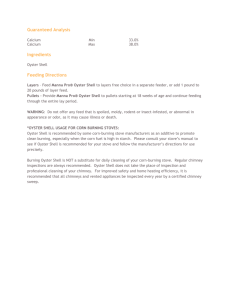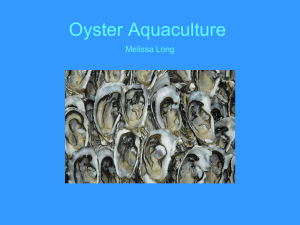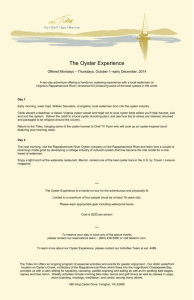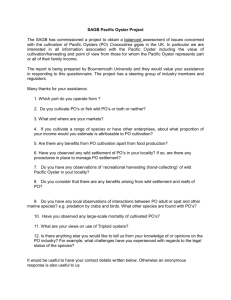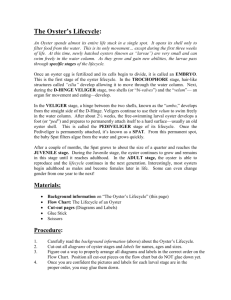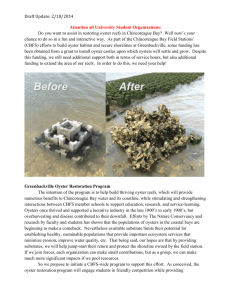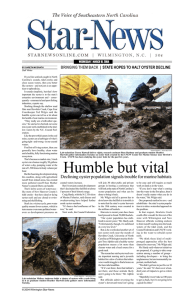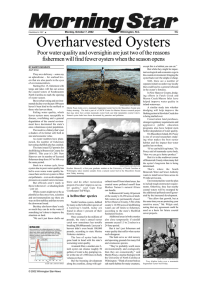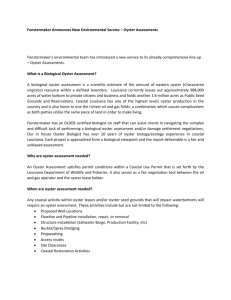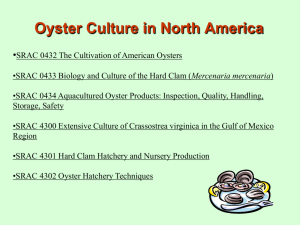Oyster Gardening Field Data Sheet for Student Groups Instructions
advertisement
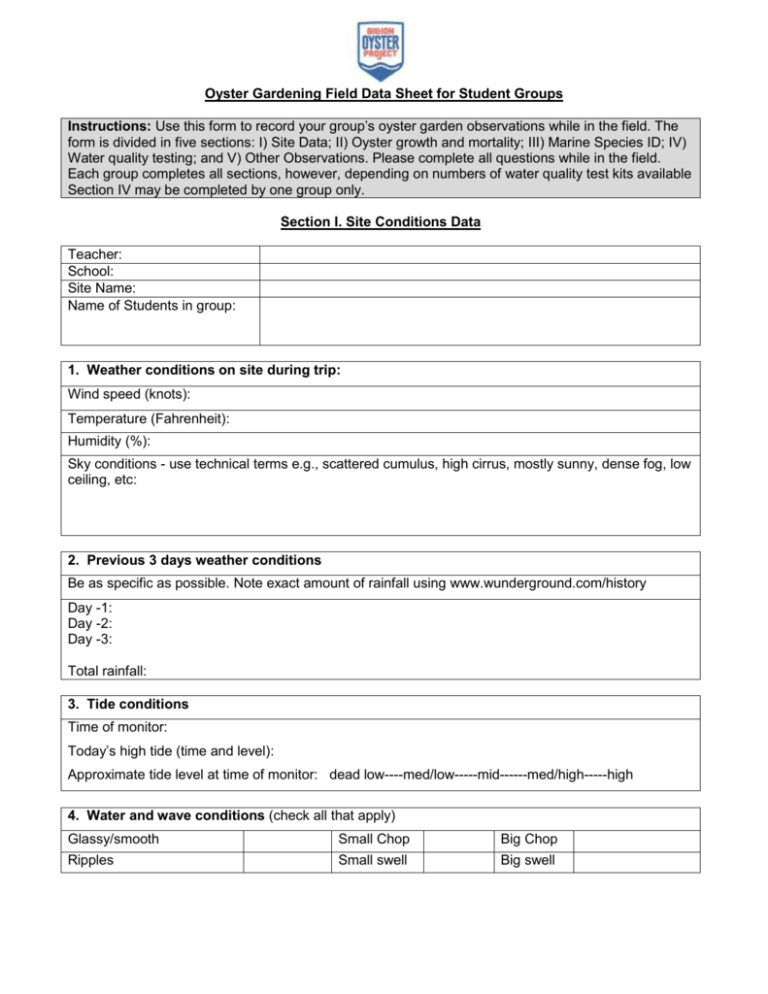
Oyster Gardening Field Data Sheet for Student Groups Instructions: Use this form to record your group’s oyster garden observations while in the field. The form is divided in five sections: I) Site Data; II) Oyster growth and mortality; III) Marine Species ID; IV) Water quality testing; and V) Other Observations. Please complete all questions while in the field. Each group completes all sections, however, depending on numbers of water quality test kits available Section IV may be completed by one group only. Section I. Site Conditions Data Teacher: School: Site Name: Name of Students in group: 1. Weather conditions on site during trip: Wind speed (knots): Temperature (Fahrenheit): Humidity (%): Sky conditions - use technical terms e.g., scattered cumulus, high cirrus, mostly sunny, dense fog, low ceiling, etc: 2. Previous 3 days weather conditions Be as specific as possible. Note exact amount of rainfall using www.wunderground.com/history Day -1: Day -2: Day -3: Total rainfall: 3. Tide conditions Time of monitor: Today’s high tide (time and level): Approximate tide level at time of monitor: dead low----med/low-----mid------med/high-----high 4. Water and wave conditions (check all that apply) Glassy/smooth Small Chop Big Chop Ripples Small swell Big swell 5. Composition and color of the water: Visibility (ft.):__________________ Observed water color:__________________ Oil sheen, marine debris, other forms of pollution observed: Other observations: 6. Depth and condition of the oyster cage: Submerged depth of cage (length of fouled line from water surface down to cage):_______________ Fouling of cage: Clean --- Lightly fouled --- Medium Fouling – Heavy Fouling Damage to cage? (please specify): 7. Land conditions: What does the shoreline look like? Is it well-maintained and clean? Is there litter or marine debris present on the shoreline? How much and what type? Other observations? II. Oyster Data 1. Measuring Oyster Growth: Measure at least 50 LIVE oysters in the sample. Keep a tally of dead oysters as you search through the sample. Shell length Shell length mm mm mm mm mm mm mm mm mm mm 2. Average shell length of sample: (total/50) Shell length mm mm mm mm mm mm mm mm mm mm Shell length mm mm mm mm mm mm mm mm mm mm Minimum shell length: Shell length mm mm mm mm mm mm mm mm mm mm Maximum shell length: 3. Oyster Mortality: Count ALL dead oysters in sample. Keep dead oysters in the cage, do not remove dead oysters from live clumps! Number of dead oysters: mm mm mm mm mm mm mm mm mm mm III. Marine Species Identification (Reef Associates and Predators) 1. Organisms observed: Use the laminated Organism ID card to identify all species found in or around the oyster garden. Check the boxes that apply or write in actual quantities if possible. None 1 to 10 10 to 100 100+ Actual Quantity Barnacles: Blue mussels: Ribbed mussels: Slipper shells: Sea squirts: Grass Shrimp: Mud crabs: Blue crabs: Clam/sand worm: Oyster drills: Other: Other: IV. Water Quality Monitoring Only the designated water quality test group should conduct water quality testing. Refer to the water quality test manual for detailed instructions. All results should be recorded in the field except for Fecal Coliform test, which requires 48 hours to incubate. Record fecal coliform test result in the classroom two days after your trip. Reading: Unit °C Water Temperature - conversion formulas: °C x 9/5 + 32 = °F | (°F - 32) x 5/9 = °C °F JTU Turbidity Pos./Neg. Fecal Coliform Dissolved Oxygen (DO) Salinity pH Nitrates Phosphates ppm ppt pH ppm ppm V. Other noteworthy observations What else do you observe in or around your oyster garden? This can include social, biological, or environmental observations. For example if you see: flocks of birds nearby, school of fish swimming around oyster garden, the oyster cage is damaged, public visitors asking questions about oyster gardening - write all of these observations here. VI. Photo upload (take photos of site, oysters, cage, water quality, etc.)

